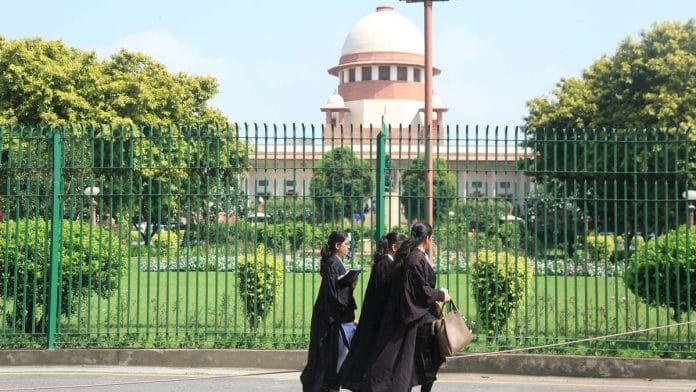New Delhi: Building up community mediation, strengthening alternative dispute redressal mechanisms in the hinterland, improving digital literacy among the masses, and giving representation to the marginalised — these are some of the objectives behind Ministry of Law and Justice’s ‘Pro Bono Club’ programme for law students.
The programme was launched last year for students pursuing legal studies in three-year as well as five-year courses. But it had to be put on hold due to Covid restrictions. It has finally taken steam this year, with about 50 law colleges coming on board, including all national law universities and IIT Kharagpur.
Launched as a sub-club under the law ministry’s Nyaya Bandhu scheme, the Pro Bono Club focuses on developing legal volunteering skills of aspiring lawyers. There is a special focus on the northeast region, and the ministry has made sure that at least one college from each state is part of the Pro Bono Club.
“Pro Bono Club seeks to catch them (law students) young to inculcate the spirit of voluntary work and also train them in the skill of drafting petitions,” a law ministry official told ThePrint.
Formulated as part of the ministry’s umbrella ‘Designing Innovation Solutions for Holistic Access to Justice in India (DISHA)’ programme, Nyaya Bandhu is a pro bono legal service to give voluntary legal advice to individuals, and to help connect registered lawyers with registered beneficiaries belonging to the marginalised sections of society.
Nyaya Bandhu entails a dedicated panel of advocates in high courts as well as district courts.
“Under the Pro Bono Club, student volunteers would get an opportunity to work with Nyaya Bandhu panel lawyers, set up by high courts. This attachment will be facilitated by the department of justice (DOJ), ministry of law, which will regularly monitor the work of student volunteers,” the official quoted above added.
Also read: Domestic disputes to Covid problems, govt’s tele-law service is bringing legal aid to millions
Educating beneficiaries
DISHA is a dedicated legal aid scheme with varied services such as tele-law programme, promotion of pre-litigation model, common service centres with dedicated advocates, and regular training programmes for beneficiaries.
DISHA, law ministry officials said, supplements the services that are provided by National Legal Services Authority (NALSA) and State Legal Services Authority (SLSA). Both NALSA and SLSA operate under a statute and their work is supervised by a sitting Supreme Court judge and a sitting state high court judge, respectively.
DISHA and the programmes under it, such as the Pro Bono Club, are, however, overseen by the Ministry of Law and Justice.
The Pro Bono Club intends to fill the vacuum created by a lack of dedicated volunteers on the ground to educate the beneficiaries about their rights under several government welfare schemes and legislations.
Once a law college joins the Pro Bono Club, it becomes eligible to receive funds from the justice department to develop a standard operating procedure (SOP) on the kind of legal aid work it intends to execute.
As part of community care assistance, the law college has to adopt a village in the district where the institution is located so that regular legal services can be extended to its residents.
“Students who agree to volunteer with the Pro Bono Club in their college would have to visit the village adopted by their institution, hold education camps and disseminate information regarding the government’s programmes and laws,” the ministry official said.
Faculty members of the colleges that have joined the club are being encouraged to come up with jurisprudence on pro bono legal services.
Although the colleges will get independence to draw up their own SOP and execute it, the ministry will hand-hold them for monitoring purposes.
“The colleges will have to submit a monthly calendar of planned activities and also prepare newsletters containing details of their activities, the outreach and testimonials from the beneficiaries of their campaigns,” an officer from the DOJ said.
A team of DOJ officers will visit law schools regularly to get an essence of what is happening on the ground.
Colleges joining the Pro Bono Club can also tap into their alumni network to raise more funds for their pro bono services. “There are two models for the Pro Bono Club in a college. One is the unassisted model, for colleges that have the wherewithal and do not need financial aid from any outside source. The second is the assisted model, under which colleges will be allowed to seek monetary assistance from NGOs or law firms,” the DOJ officer said.
Since the law ministry is encouraging colleges to develop legal volunteering as a specialised area, it has emphasised that pro bono services should become a regular activity in legal education centres. “In case students of a particular college show promise, then the ministry can involve them in ministerial tasks as well,” the officer added.
Another feature of the Pro Bono Club is mentoring sessions for student members of the club. “Volunteers in the legal aid field need to be sensitive and patient towards the marginalised sections. In these sessions with experienced, professional legal volunteers, students would be trained to improve their communication abilities, including body language, so that in their interaction with the beneficiaries they come across as their well-wishers,” said the officer.
(Edited by Nida Fatima Siddiqui)
Also read: It’s time the Supreme Court went live, your lordships






